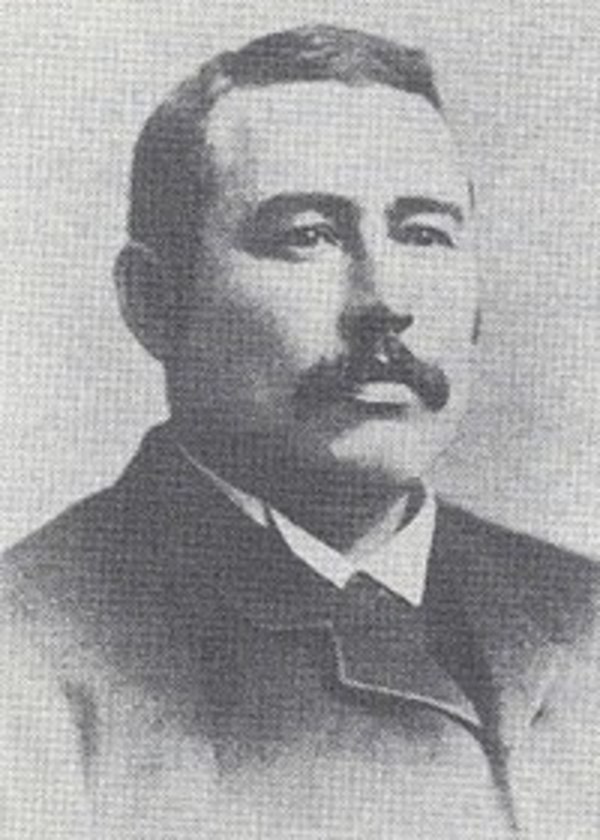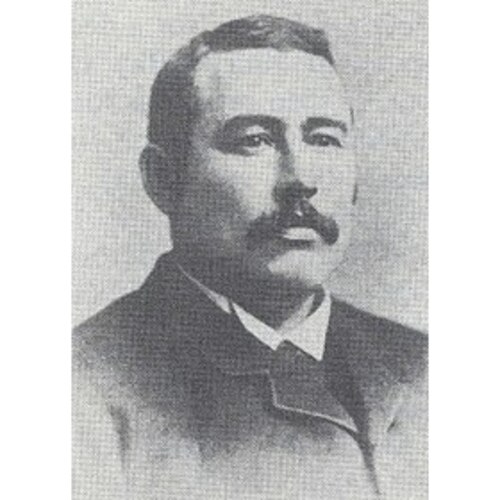
Source: Courtesy of Wikimedia Commons
McGRATH, JAMES FRANCIS, fisherman, politician, and civil servant; b. 23 May 1859 in Little Placentia (Argentia), Nfld, eldest son of Richard McGrath; m. first Theresa Power of Oderin, Nfld; m. secondly Kate McCarthy of Red Island, Placentia Bay; m. thirdly 18 Feb. 1896 Minnie Aylward; there were three sons and two daughters; d. 29 Oct. 1902 in Halifax.
The son of a stipendiary magistrate who represented the district of Placentia and St Mary’s in the House of Assembly in the early 1860s, Jim McGrath received his education at Oderin and at St Bonaventure’s College in St John’s. He first worked as a fisherman at Oderin, operating his own boat or “jack,” and then established a business running fishing ships to catch cod on the Grand Banks and herring in Placentia Bay.
In 1885 McGrath, as he later told a St John’s journalist, “stepped from a fishing ‘jack,’ to the floors of the Legislature” when he won election to the House of Assembly as one of three Roman Catholic Liberal representatives for the fishing district of Placentia and St Mary’s. It was a district where his family, through its business operations and his father’s role as a magistrate, was well known. During the years 1886 to 1889 Newfoundland politics were in a state of flux. Although in the assembly the Roman Catholic Liberal party numerically formed the opposition to Sir Robert Thorburn’s Protestant-dominated and mercantile Reform government, the real opposition was a small group of supporters of former premier Sir William Vallance Whiteway, who had retired from politics in 1885. The Liberal party after 1886 was led by Patrick J. Scott*, and for the 1889 election he took a number of Liberal mhas with him into the ranks of the Thorburn party. McGrath was one of several Liberal members who supported the Whiteway faction, which in the 1889 election claimed for itself the name Liberal party. It included both Protestant and Roman Catholic candidates, and it won an overwhelming victory.
By 1889 McGrath had a reputation as one of the best authorities on the island’s south-coast fisheries. He was a member of the Newfoundland Fisheries Commission, established in 1889 under the chairmanship of Augustus William Harvey, and served until 1895. A Norwegian civil servant, Adolph Nielsen, was responsible for the commission’s daily work. Its role was to conduct scientific investigation of local fisheries and to ensure the preservation of fish stocks. In 1890 Whiteway appointed McGrath to succeed Daniel Woodley Prowse* as commissioner of the Bait Protection Service, whose mandate was to prevent the sale of local bait to French fishermen. Water Street merchants in St John’s believed that strong French competition was adversely affecting Newfoundland’s place in world markets, and Thorburn had had legislation passed in 1887 restricting the sale of local bait.
McGrath, along with the Whiteway party, won re-election in 1893, and he received an appointment late that year as chairman of the Board of Works. The position involved the administration of public buildings, properties, and services throughout the island and, in the absence of municipal bodies outside St John’s, gave the chairman control of the expenditure of funds for public works and hence their disposal for partisan political purposes. Such use of public funds had occurred during the 1893 general election (as it had in past elections in Newfoundland). In early 1894 the Tory opposition attempted to have government members disqualified on these grounds from sitting in the House of Assembly. Tory lawyer and mha Alfred Bishop Morine* took action in the Supreme Court under the Corrupt Practices Act of 1889, and McGrath was one of 15 sitting members who were forced to resign their seats later in the year. The governing Liberals turned over the reins of power to Tory leader Augustus Frederick Goodridge.
In subsequent by-elections Liberals were returned, and a new Liberal government under Daniel Joseph Greene assumed office in December 1894. Greene had legislation passed enabling the disqualified Liberals to run once more for office. Several of them, including Whiteway, Robert Bond*, and Edward Patrick Morris*, did so with the result that Whiteway in February 1895 became premier again. In the by-election held to replace the disqualified McGrath, his brother Richard T. won election for the Liberals, and he would represent the district until 1897. The Whiteway government in 1895 appointed Jim McGrath governor of the island’s penitentiary to succeed John Roche McCowen, who had been made inspector general of the Newfoundland Constabulary.
In politics McGrath was an intense, sometimes sectarian, campaigner; as one contemporary observed, he was a “foremost fighter for his party and cause.” He died at Halifax while en route to Newfoundland from Boston, where he had undergone kidney surgery.
Daily News (St John’s), 1 Aug. 1894, 30 Oct. 1902. Evening Telegram (St John’s), 19 Feb. 1896, 29 Oct. 1902. Trade Review (St John’s), 1 Nov. 1902. Almanac, Nfld year book, 1890–96. Hiller, “Hist. of Nfld.” Nfld men (Mott). Prowse, Hist. of Nfld (1895).
Cite This Article
Melvin Baker, “McGRATH, JAMES FRANCIS,” in Dictionary of Canadian Biography, vol. 13, University of Toronto/Université Laval, 2003–, accessed December 25, 2024, https://www.biographi.ca/en/bio/mcgrath_james_francis_13E.html.
The citation above shows the format for footnotes and endnotes according to the Chicago manual of style (16th edition). Information to be used in other citation formats:
| Permalink: | https://www.biographi.ca/en/bio/mcgrath_james_francis_13E.html |
| Author of Article: | Melvin Baker |
| Title of Article: | McGRATH, JAMES FRANCIS |
| Publication Name: | Dictionary of Canadian Biography, vol. 13 |
| Publisher: | University of Toronto/Université Laval |
| Year of publication: | 1994 |
| Year of revision: | 1994 |
| Access Date: | December 25, 2024 |



